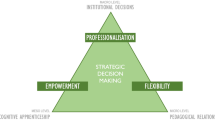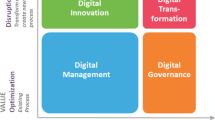Abstract
The increasing prevalence of learner-centred forms of learning as well as an increase in the number of learners actively participating on a wide range of digital platforms and devices give rise to an ever-increasing stream of learning data. Learning analytics (LA) can enable learners, teachers, and their institutions to better understand and predict learning and performance. However, the pedagogical perspective and matters of learning design have been underrepresented in research thus far. In our paper, we propose a general design framework that includes critical dimensions of LA and assists in creating LA services that support educational practice. On the basis of a two-dimensional framework (individual vs. social, reflection vs. prediction), we then identify four generic approaches to LA aimed at improving learning process and learning outcomes. To demonstrate the application, four use cases are outlined that are based on four previously elaborated generic approaches to LA. Finally, we discuss the validation of the model and close with an outlook on relevant future research.


Similar content being viewed by others
References
Abdous, M., He, W., & Yen, C.-J. (2012). Using data mining for predicting relationships between online question theme and final grade. Educational Technology & Society, 15(3), 77–88.
Ackermann, F., Eden, C., & Cropper, S. (2004). Getting started with cognitive mapping. Retrieved from http://www.banxia.com/pdf/de/GettingStartedWithCogMapping.pdf.
Ali, L., Hatala, M., Gašević, D., & Jovanović, J. (2012). A qualitative evaluation of evolution of a learning analytics tool. Computers & Education, 58(1), 470–489.
Bakharia, A., Corrin, L., de Barba, P., Kennedy, G., Gašević, D., Mulder, R., et al. (2016). A conceptual framework linking learning design with learning analytics. In Proceedings of the sixth international conference on learning analytics & knowledge (pp. 329–338). New York: ACM Press.
Barber, R., & Sharkey, M. (2012). Course correction: Using analytics to predict course success. In Proceedings of the 2nd international conference on learning analytics and knowledge (pp. 259–262). New York: ACM Press.
Berking, P., Foreman, S., Haag, J., & Wiggins, C. (2014). The experience API—Liberating learning design. Report, eLearning Guild.
Berkling, K., & Thomas, C. (2013). Gamification of a software engineering course and a detailed analysis of the factors that led to its failure. In M. E. Auer & D. Guralnick (Eds.), Proceedings of international conference on interactive collaborative learning (pp. 525–530). https://doi.org/10.1109/icl.2013.6644642.
Bloom, B. S. (1984). The 2 Sigma Problem: The search for methods of group instruction as effective as one-to-one tutoring. Educational Researcher, 13(6), 4–16.
Buckingham Shum, S., & Deakin Crick, R. (2012). Learning dispositions and transferable competencies: Pedagogy, modelling and learning analytics. In Proceedings 2nd international conference on learning analytics & knowledge (pp. 324–335). New York: ACM Press.
Buckingham Shum, S., & Ferguson, R. (2012). Social learning analytics. Educational Technology & Society, 15(3), 3–26.
Butz, M. V., Sigaud, O., & Gerard, P. (2003). Internal models and anticipations in adaptive learning systems. In M. V. Butz, O. Sigaud, & P. Gerard (Eds.), Anticipatory behavior in adaptive learning systems. Volume 2684 of the series lecture notes in computer science (pp. 86–109). Berlin: Springer.
Chatti, M. A., Dyckhoff, A. L., Schroeder, U., & Thüs, H. (2012). A reference model for learning analytics. International Journal of Technology Enhanced Learning, 4(5/6), 318–331.
Clow, D. (2012). The learning analytics cycle: Closing the loop effectively. In Proceedings of the 2nd international conference on learning analytics and knowledge (pp. 134–138). New York: ACM Press.
Cope, B., & Kalantzis, M. (2016). Big data comes to school: Implications for learning, assessment, and research. AERA Open, 2(2), 1–19.
Dawson, S. (2008). A study of the relationship between student social networks and sense of community. Educational Technology & Society, 11(3), 224–238.
Dawson, S., & Siemens, G. (2014). Analytics to literacies: The development of a learning analytics framework for multiliteracies assessment. The International Review of Research in Open and Distributed Learning, 15(4), 285. Retrieved from http://www.irrodl.org/index.php/irrodl/article/view/1878/3006.
Deterding, S., Dixon, D., Khaled, R., & Nacke, L. (2011). From game design elements to gamefulness. In Academic MindTrek 2011, ACM Digital Library. ACM Special Interest Group on Computer-Human Interaction. & ACM Special Interest Group on Multimedia. (Eds.), Proceedings of the 15th international academic MindTrek conference envisioning future media environments. Defining „Gamification“ (pp. 9–15). New York: ACM Press.
Dicheva, D., Dichev, C., Agre, G., & Angelova, G. (2015). Gamification in education: A systematic mapping study. Educational Technology & Society, 18(3), 75–88.
Duval, E. (2011). Attention please! Learning analytics for visualization and recommendation. In Proceedings of the 1st international conference on learning analytics and knowledge (pp. 9–17). New York: ACM Press.
Dyckhoff, A. L., Zielke, D., Bültmann, M., Chatti, M. A., & Schroeder, U. (2012). Design and implementation of a learning analytics toolkit for teachers. Educational Technology & Society, 15(3), 58–76.
Evans, C. (2013). Making sense of assessment feedback in higher education. Review of Educational Research, 83, 70–120.
Ferguson, R., Clow, D., Macfadyen, L., Essa, A., Dawson, S., & Alexander, S. (2014). Setting learning analytics in context: Overcoming the barriers to large-scale adoption. Journal of Learning Analytics, 1(3), 120–144.
Gibson, A., Kitto, K., & Willis, J. (2014). A cognitive processing framework for learning analytics. In Proceedings of the fourth international conference on learning analytics and knowledge (pp. 212–216). New York: ACM Press.
Greller, W., & Drachsler, H. (2012). Translating learning into numbers: A generic framework for learning analytics. Educational Technology & Society, 15(3), 42–57.
Ifenthaler, D. (2015). Learning analytics. In J. M. Spector (Ed.), The SAGE encyclopedia of educational technology (Vol. 2, pp. 447–451). Thousand Oaks, CA: Sage.
Ifenthaler, D., Adcock, A. B., Erlandson, B. E., Gosper, M., Greiff, S., & Pirnay-Dummer, P. (2014). Challenges for education in a connected world: Digital learning, data rich environments, and computerbased assessment—Introduction to the inaugural special issue of technology, knowledge and learning. Technology, Knowledge and Learning, 19(1), 121–126.
Ifenthaler, D., & Widanapathirana, C. (2014). Development and validation of a learning analytics framework: Two case studies using support vector machines. Technology, Knowledge and Learning, 19(1–2), 221–240.
Kelly, N., Thompson, K., & Yeoman, P. (2015). Theory-led design of instruments and representations in learning analytics: Developing a novel tool for orchestration of online collaborative learning. Journal of Learning Analytics, 2(2), 14–43.
Leitner, P., Khalil, M., & Ebner, M. (2017). Learning analytics in higher education—A literature review. In A. Peña-Ayala (Ed.), Learning analytics: Fundaments, applications, and trends (pp. 1–23). Berlin: Springer International Publishing. https://doi.org/10.1007/978-3-319-52977-6_1.
Lin, C.-F., Yeh, Y., Hung, Y. H., & Chang, R. (2013). Data mining for providing a personalized learning path in creativity: An application of decision trees. Computers & Education, 68, 199–210.
Loh, C. S., Sheng, Y., & Ifenthaler, D. (2015). Serious games analytics: Theoretical framework (pp. 3–29). Berlin: Springer.
Mah, D.-K. (2016). Learning analytics and digital badges: Potential impact on student retention in higher education. Technology, Knowledge and Learning, 21(2), 285–305.
Mak, H. W. (2013). The gamification of college lectures at the University of Michigan. Retrieved from http://www.gamification.co/2013/02/08/the-gamification-of-college-lectures-at-the-university-of-michigan/.
Manouselis, N., Drachsler, H., Vuorikari, R., Hummel, H., & Koper, R. (2010). Recommender systems in technology enhanced learning. In P. B. Kantor, F. Ricci, L. Rokach, & B. Shapira (Eds.), Recommender systems handbook (pp. 387–415). Berlin: Springer.
Nour, M., Abed, E., & Hegazi, N. (1995). A proposed student model algorithm for an intelligent tutoring system. In Proceedings of the 34th SICE annual conference. International session papers (pp. 1327–1333), Hokkaido.
Papamitsiou, Z., & Economides, A. (2014). Learning analytics and educational data mining in practice: A systematic literature review of empirical evidence. Journal of Educational Technology & Society, 17(4), 49–64.
Pardo, A., & Kloos, C. D. (2011). Stepping out of the box: Towards analytics outside the learning management system. In Proceedings of the 1st international conference on learning analytics and knowledge (pp. 163–167). New York, NY: ACM Press.
Roberts, L. D., Howell, J. A., & Seaman, K. (2017). Give me a customizable dashboard: Personalized learning analytics dashboards in higher education. Technology, Knowledge, and Learning, 22(3), 317–333.
Romero, C., Ventura, S. Espejo, P. G., & Hervs, C. (2008). Data mining algorithms to classify students. In R. de Baker, T. Barnes, & J. Beck (Eds.), Proceedings of the 1st international conference on educational data mining (pp. 8–17). Retrieved from http://www.educationaldatamining.org/EDM2008/-uploads/proc/1_Romero_3.pdf.
Romero-Zaldivar, V.-A., Pardo, A., Burgos, D., & Kloos, C. D. (2012). Monitoring student progress using virtual appliances: A case study. Computers & Education, 58(4), 1058–1067.
Scheffel, M., Drachsler, H., Stoyanov, S., & Specht, M. (2014). Quality indicators for learning analytics. Journal of Educational Technology & Society, 17(4), 117–132.
Schreurs, B., De Laat, M., Teplovs, C., & Voogd, S. (2014). Social learning analytics applied in a MOOC-environment. e-Learning Papers, 26, 45–48.
Seufert, S., Preisig, L., Krapf, J., & Meier, C. (2017). Von Gamification zum systematischen Motivationsdesign mit kollaborativen und spielerischen Gestaltungselementen. Konzeption und Anwendungsbeispiele (scil Arbeitsberichte No. 27). St.Gallen: Institut für Wirtschaftspädagogik/scil.
Siemens, G., Gasevic, D., Haythornthwaite, C., Dawson, S., Shum, S. B., Ferguson, R., et al. (2011, July 28). Open learning analytics: An integrated & modularized platform.
Sin, K., & Loganathan, M. (2015). Application of big data in education data mining and learning analytics—A literature review. ICTACT Journal on Soft Computing, 5(4), 1035–1049. https://doi.org/10.21917/ijsc.2015.0145.
Tempelaar, D. T., Rienties, B., & Giesbers, B. (2015). In search for the most informative data for feedback generation: Learning Analytics in a data-rich context. Computers in Human Behavior, 47, 157–167.
Verbert, K., Manouselis, N., Drachsler, H., & Duval, E. (2012). Dataset-driven research to support learning and knowledge analytics. Educational Technology & Society, 15(3), 133–148.
West, D., Heath, D., & Huijser, H. (2015). Let’s talk learning analytics: A framework for implementation in relation to student retention. Online Learning, 20(2), 12. Retrieved from https://olj.onlinelearningconsortium.org/index.php/olj/article/viewFile/792/202.
Wise, A. F., Vytasek, J. M., Hausknecht, S., & Zhao, Y. (2016). Developing learning analytics design knowledge in the “middle space”: The student tuning model and align design framework for learning analytics use. Online Learning, 20(2), 3. Retrieved from https://olj.onlinelearningconsortium.org/index.php/olj/article/view/783.
Acknowledgements
Funding was provided by Research Grant of the University of St. Gallen.
Author information
Authors and Affiliations
Corresponding author
Additional information
Publisher's Note
Springer Nature remains neutral with regard to jurisdictional claims in published maps and institutional affiliations.
Rights and permissions
About this article
Cite this article
Seufert, S., Meier, C., Soellner, M. et al. A Pedagogical Perspective on Big Data and Learning Analytics: A Conceptual Model for Digital Learning Support. Tech Know Learn 24, 599–619 (2019). https://doi.org/10.1007/s10758-019-09399-5
Published:
Issue Date:
DOI: https://doi.org/10.1007/s10758-019-09399-5




